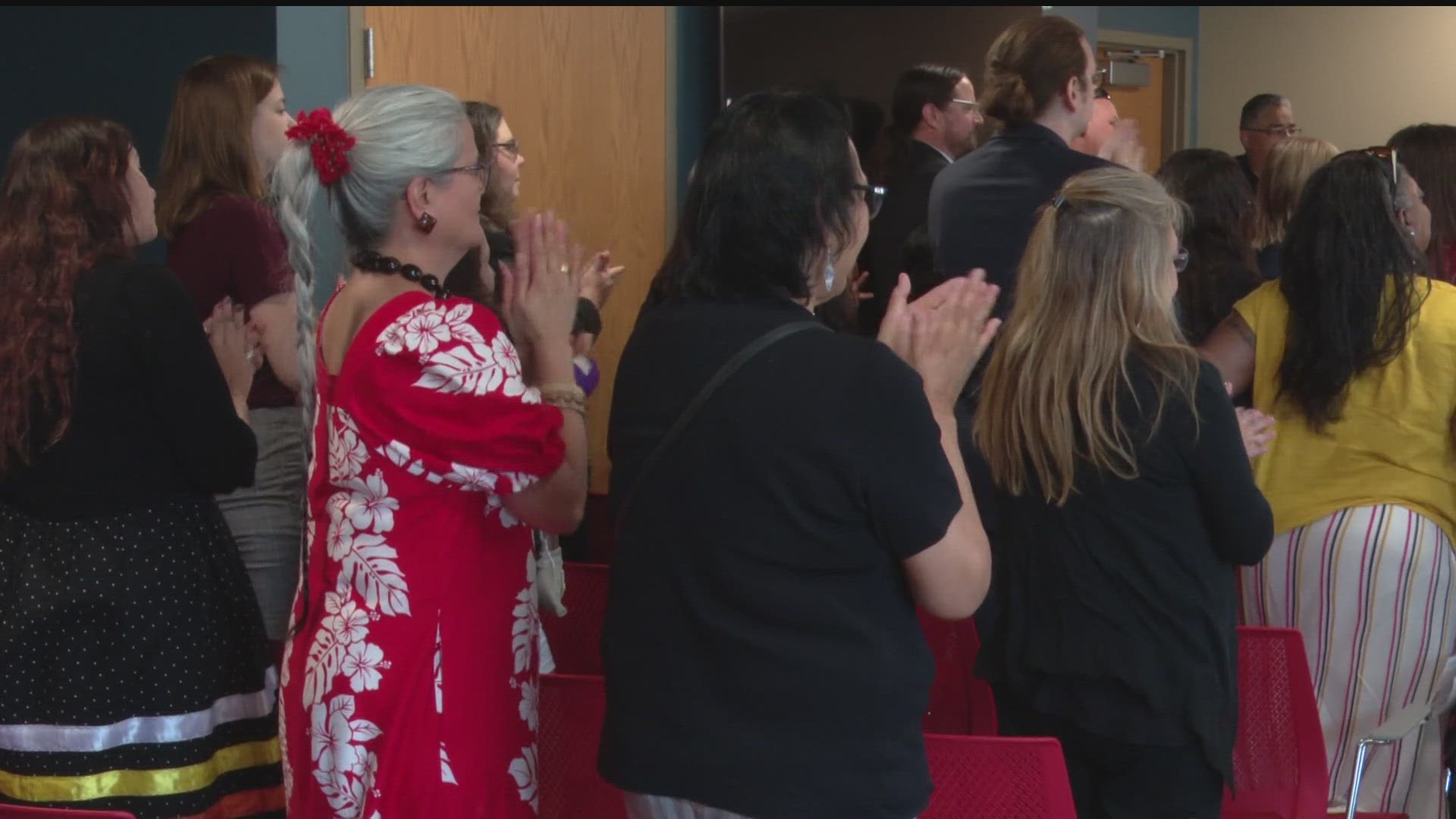ST PAUL, Minn. — A day after the U.S. Supreme Court upheld the Indian Child Welfare Act tribal leaders, advocates and politicians gathered to savor the surprise victory.
Sen. Tina Smith originally organized the event at the Mino Oski Ain Dah Yung Center on in Saint Paul as a strategy roundtable discussion on navigating the legal landscape assuming the Supreme Court would strike down the 1978 federal law.
But the high court's resounding affirmation of ICWA, on a 7 to 2 vote, sent shock waves of joy throughout Native American communities across the country. The planned forum turned into a celebration.
"All day it was text messages from family, and from friends, and from all over Indian country, saying we cannot believe it," Lt. Gov. Peggy Flanagan, a member of the White Earth Nation, told the crowd Friday afternoon.
"We get to keep our babies. We get to raise our babies. And we get to love our babies," Flanagan remarked.
Senator Mary Kunesh, who spearheaded efforts to reinforce Minnesota's American Indian Family Preservation Act, read directly from the Supreme Court's majority opinion.
"Our constitution reserves for the tribes a place, an enduring place, in the structure of the American life. It promises them sovereignty for as long as they wish to keep it," Kunesh read.
Sen. Smith reminded non-Native reporters in the room why the ICWA was such a significant piece of legislation.
"Before ICWA was passed 25 percent of Native children were removed from their families," Smith explained. "And I’m not even talking about the long and terrible, tragic legacy of the boarding school movement."
Many see a direct connection between the boarding schools that removed Indigenous children from their culture and languages and current efforts to overturn ICWA.
"Our language is in our songs, our ceremonies, it’s our sound, it’s sacred to us. It’s our medicine. It’s in everything that we do," Laurie York, who serves on the Minnesota Department of Human Services Indian Child Welfare Advisory Council, told reporters and audience members.
Kevin DuPuis Sr., the chairman of the Fond du Lac Band of Lake Superior Chippewa, said it's difficult for non-Native people to understand how it feels to lose control of their families.
"Imagine how you'd feel. You have three children, and they come in and ask you 'which one are you going to give up?' That’s our life. That’s our history."
DuPuis and York both called on the federal government to invest more in tribal language immersion programs, to undo the harm done by adoption policies and the boarding schools.
The guest of honor at Friday's event was White Earth Nation member Robyn Bradshaw who spent years fighting for and winning custody of her granddaughter, relying on the Indian Child Welfare Act.
"I just want to thank everybody for being here today. We won!"
All of the speakers said the Supreme Court's decision not only upheld custody and adoption rights for Native families, but it also reinforced tribal sovereignty and self-determination of American Indian communities.
On Thursday, Mitchell Hamline Law School professor Angelique EagleWoman said it was especially compelling that the high court's ruling carried the name of U.S. Interior Secretary Deb Haaland.
"It is very full circle to have Secretary of Interior Deb Haaland, a Laguna Pueblo woman, named on a case that upholds the Indian Child Welfare Act," EagleWoman remarked.
"This is true justice, and this is culturally affirming. I’m sure she feels very much a sigh of relief."
EagleWoman said the law at its most basic form is designed to help Native American Children maintain their cultural identity. Adoption preference is given first to the child’s immediate family, next to a family from the same tribal group, and third to any Native American family.
"The Indian Child Welfare Act in the preamble states that Congress acknowledges tribal children are the most important part of our tribal nations. Without our children, we don’t exist."
Watch more Minnesota politics:
Watch the latest political coverage from the Land of 10,000 Lakes in our YouTube playlist:
WATCH MORE ON KARE 11+
Download the free KARE 11+ app for Roku, Fire TV, Apple TV and other smart TV platforms to watch more from KARE 11 anytime! The KARE 11+ app includes live streams of all of KARE 11's newscasts. You'll also find on-demand replays of newscasts; the latest from KARE 11 Investigates, Breaking the News and the Land of 10,000 Stories; exclusive programs like Verify and HeartThreads; and Minnesota sports talk from our partners at Locked On Minnesota.
- Add KARE 11+ on Roku here or by searching for KARE 11 in the Roku Channel Store.
- Add KARE 11+ on Fire TV here or by searching for KARE 11 in the Amazon App Store.
- Learn more about the KARE 11+ app for Apple TV in the Apple App Store.
- Learn more about KARE 11+ here.

